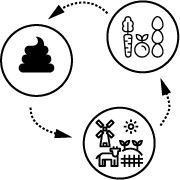The project combined evidence synthesis methodology and transdisciplinary research. Co-design activities were mostly anchored in the Swedish Nutrient Platform (SNP).
This approach was grounded in the belief that a diverse set of actors needs to be part of the process to decide how to integrate and consolidate knowledge, and how to collect evidence of the most appropriate solutions for specific contexts. Therefore, evidence synthesis methodology is combined with co-design activities with prospective uses of the evidence platform. This allows to address deficiencies in knowledge synthesis and sharing, while at the same time strenghtening collaboration and creating enthusiasm for new solutions and their implementation.
Evidence Synthesis
Systematic maps and reviews (here referred to as evidence synthesis) are methods for collating, describing and summarizing relevant research on a specific topic. Evidence synthesis aims to maximize comprehensiveness, transparency, and objectivity at each stage of the review process while minimizing bias. Evidence synthesis methodology is of particular importance for a number of reasons. First, there is an overproduction of research that decision makers in policy and practice have no time to deal with. Second, findings from one study cannot always be generalized to multiple contexts. Last but not least, much of the original research output is not accessible to public-sector players, notably in low-income countries, as it is hidden behind paywalls.
Transdisciplinary Research
A transdisciplinary approach follows current best practice in sustainability science and fully embraces the increasing understanding that co-production by academics and non-academics promises to better address the complex nature of contemporary sustainability challenges than more traditional scientific approaches. Norström and colleagues have identified four key principles that are crucial for co-production to be successful.
Context-based
The process is situated in a particular context, place, or issue.
Pluralistic
Multiple ways of knowing and doing are explicitly recognised.
Goal-oriented
Shared and meaningful goals that relate to the challenge at hand are clearly articulated.
Interactive
Learning among actors through active engagement and frequent interactions.
Swedish Nutrient Platform (SNP)
In Sweden, RISE and IVL have partnered with five large wastewater utilities to create the SNP as a way to engage stakeholders in a process of co-creating systemic change towards circular and sustainable use of nutrients.
In 2019, the SNP has, independently from us, flagged the need to compile and integrate the latest knowledge on nutrient and carbon recirculation solutions from both research and practice. Therefore we decided to anchor our project in the platform.

